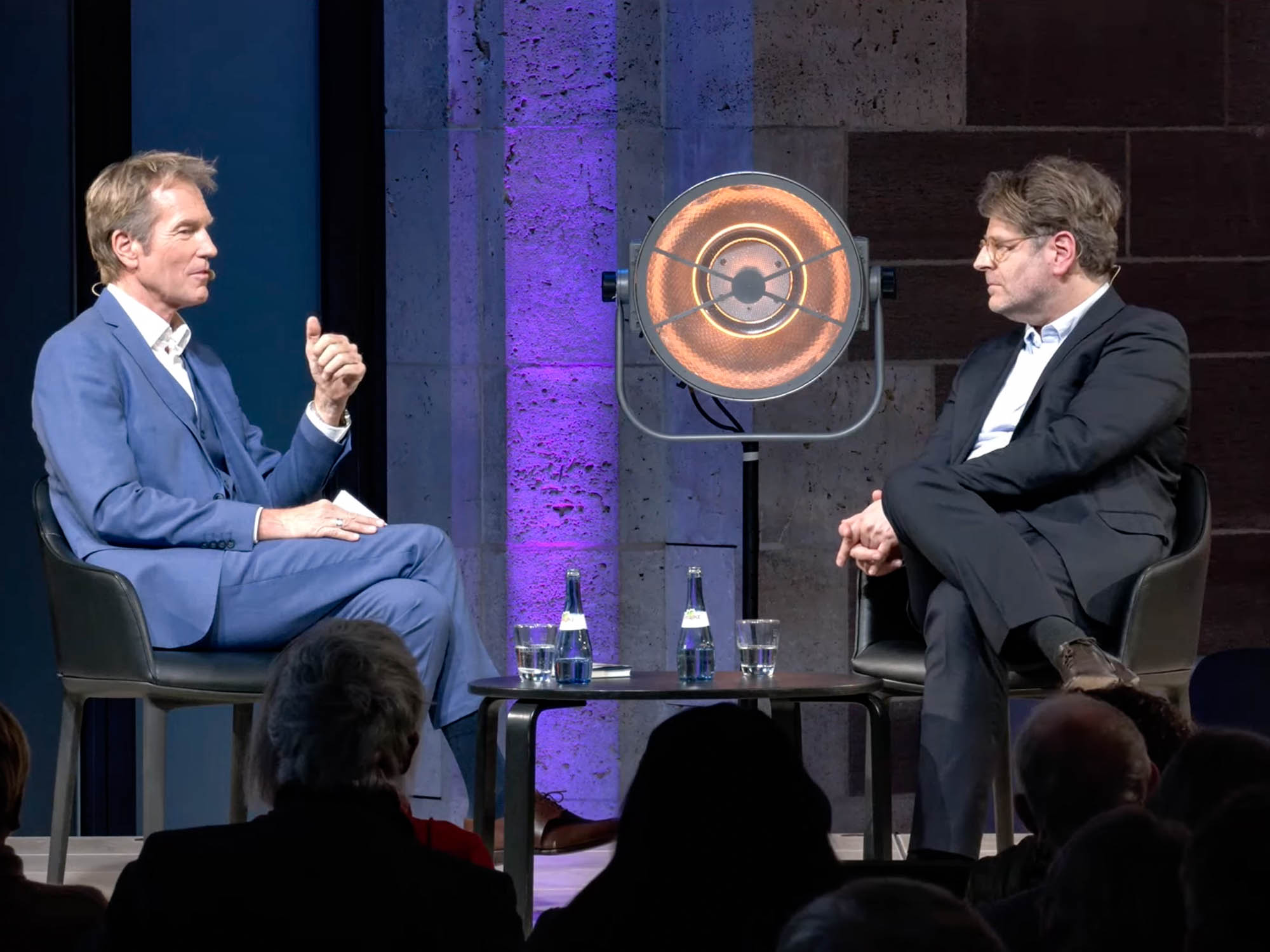As part of its series on Humanity, Development and the Future, the Mahle Foundation invited the philosopher and journalist Alexander Grau, who has been critical for some time of the current “hypermorality”. Grau speaks of the victory of morality over reason and wonders if we are dealing with a modern form of the inquisition. Below are a few passages from and about the conversation.
We like to make the point that Germany is a country that guarantees freedom of speech. Anyone questioning this is seen as a suspicious person, casting doubt on the legitimacy of our democracy. Legislation, after all, ensures the freedom of the press, and there is no censorship. But does it really need a dictatorship to curtail freedom of speech? Referring to Alexis de Tocqueville (1805-1859), Alexander Grau claims that democracy can do this too. It is a form of rule, even if it is the majority that rules. And rule exerts coercion. Tocqueville wrote, “In a democracy, the master no longer says: ‘You shall think as I do or you shall die’; but they say: ‘You are free to think differently from me and to retain your life, your property, and all that you possess; but you are henceforth a stranger among your people. You may retain your civil rights, but they will be useless to you, for you will never be chosen by your fellow citizens if you solicit their votes; and they will affect to scorn you if you ask for their esteem. You will remain among men, but you will be deprived of the rights of humankind. Your fellow creatures will shun you like an impure being; and even those who believe in your innocence will abandon you, lest they should be shunned in their turn. Go in peace! I have given you your life, but it is an existence worse than death.’” (Tocqueville 1835)
Alexander Grau speaks of the networks of proper public opinion, of analogue and digital executioners of political correctness. While they may not act as the medieval inquisition, they have the power to exclude individuals or groups from the discourse and label them disputed. They work with moralism, which is not to be confused with morality. Moralism is morality as ideology. Grau thinks that this is quite a new phenomenon. For in ‘modern moralism’, morality itself is the ideology. Traditionally, moralities were derived from a higher world view. Moralism as ideology no longer knows such a higher perspective and therefore tends toward radicalization. Alexander Grau calls this “hypermoralism”. Pragmatic considerations or factual arguments don’t count. This leads to a moralistic monoculture that is seen to be always right in any discourse. Similar moral teachings are conveyed today in theaters, at cultural festivals, and on the radio. This moralism presumes the right to determine what being democratic means. It endangers democracy, freedom, and individualism because it aims to force individuals into a corset of the right, morally acceptable opinion.
Hypermoral – die neue Lust an der Empörung (Hypermorality – the New Pleasure in Outrage) is the title of a book that Alexander Grau wrote in 2017, when terms such as “wokeness” and “cancel culture” were not yet in vogue. The dramatic, paradigmatic experience that caused these thoughts was his engagement with Thilo Sarrazin’s 2010 book Deutschland schafft sich ab (Germany Abolishes Itself). This unfolded in view of the mechanisms of blame, hype, and ostracism, and the last straw was the concurrent insistence that all of these weren’t ostracizing. The same arguments we are hearing today, week in and week out, were reeled off even then. Grau has observed the rise of these phenomena since the 2000s. Is this “hypermorality” caused by the disappearance of religion, by secularization? Moralism has great potential when one tries to find meaning. Political-moral movements provide religious derivatives. For the younger generations, these are something to hold on to among climate change, fear of the future, and the search for the right actions. People are more sensitive and mindful today. And this in itself is a good thing. The question for Grau is: Does this make me a “moral Talibanist”? In his book he speaks of people “feeling certain”. We feel things now. It’s no longer about facts, but about feelings. We are emotional beings, but we should be able to check our feelings in debates and discern resentment from argument. Mass media play a crucial part here. Because of their built-in psychology, they contribute to emotionalizing the debates. And social media fuels the flames. This commotion can only be met if we keep our cool. Even in hysterical discussions one can discover, and agree with, the true concern behind certain forms of discrimination. In “hypermoralism” on the other hand, morality is going wild and lacks any basis in reality. And the mass media perpetuate this “political and moral patronizing”.
But what shall we do when 40 percent of our society feel they have to watch their words? Grau thinks that institutions are responsible for keeping the debate open. They could do this by inviting rather than uninviting “unwelcome” speakers and allow for other opinions to be heard. He doubts that there is a real alternative. For him, these are the developments of a late-industrial society with a certain level of prosperity and the corresponding social processes. Western societies, with our economic and technological positions, generate moralism. We can only “eradicate” this if we go to the roots and stop trying to protect our prosperity. Maybe Grau is showing his true colours as a Marxist here.
More information Mahle-Stiftung
Translation Margot M. Saar
Image Screenshot from video recording






I don’t see how Germany can claim that it respects free speech. very recently a woman was fined $900 for saying that Ukraine deserved to be invaded by Russia. When Vera Sharav ( an elderly lady and a holocaust survivor) spoke of similarities between the third reich and some of what was happening during covid, she was also prosecuted for hate speech by the regional government. Meanwhile, the newspaper which falsely called her an “imposter” faced no consequences.
In “hypermoralism destroy’s freedom” morality is going wild and lacks any basis in reality and the mass media perpetuate this “political and moral patronizing”.
absolutely magnificent ! dankeschon Herr Grau!
the masses seem intent on being hypnotised by a controlled media that Putin’s political ambitions are being HIDDEN by his criminal ambitions (contact InterPol) he is running the largest worldwide mafia/criminal syndicate from slavery to body parts .. yes other nations have such organisation as well (MOSAD) but they haven’t yet degenerated to Putin’s level .. sure all holocaust survivors will see some justice being executed by Putin’s genocide against Ukraine who were also complicit in the last holocaust along with ALL other nations who failed to send any evacuation ships. None have a monopoly on evil or decency ..
I’m shocked to hear this.
I myself believe Russia has had its legitimate concerns ignored by the west. Let’s trust the war is soon over and NATO returns to being a defensive alliance.
The articles I read in the dasgoetheanum are inspiring. They offer “food for thought”.
Not only do they help to broaden my thinking on social issues. And now after this article of Grau I need to be less Moralistic in my judgement of others; more gentle in intellectual exchange with others with a different viewpoint. Perhaps I could practice to be more humble in expressing my own truths?
I have found the articles in this issue so inspiring that now,on vacation and having / taking the time to read, I have forwarded them to two different persons, one in Zwitserland and now today to my brother living in the USA. I have been living in The Netherlands since 54 years but was born in Canada.